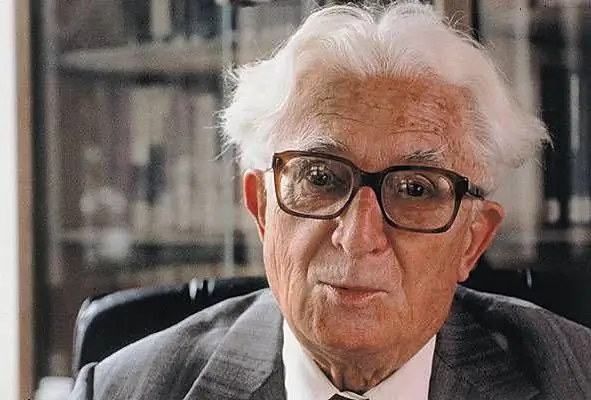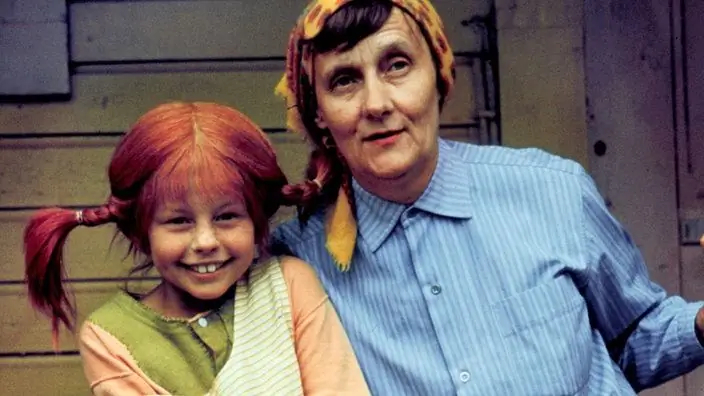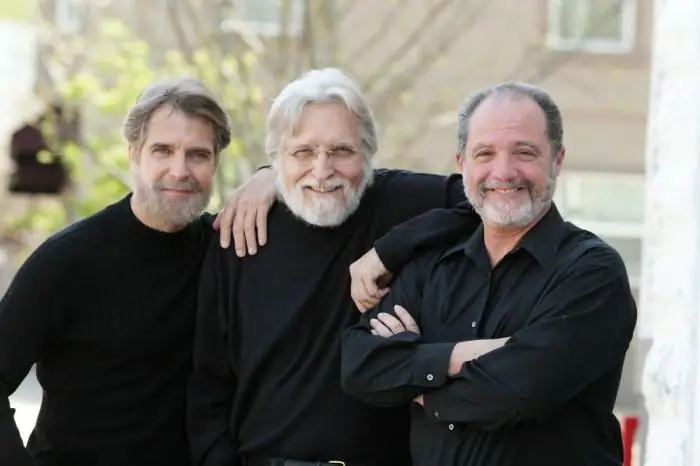
Table of contents:
- Biography
- Return to Paris and fateful acquaintance
- Post-war years
- First publications and the House of Sciences
- Recent years
- Interesting facts
- Fernand Braudel: "What is France?"
- Material civilization, economy and capitalism
- Part One: "The Structures of Everyday Life"
- Second part: "Exchange Games"
- Third part: "Time of Peace"
- Author Sierra Becker becker@designhomebox.com.
- Public 2024-02-26 03:35.
- Last modified 2025-01-22 22:09.
Fernand Braudel is one of the most famous French historians. His idea to take into account geographical and economic facts when comprehending historical processes revolutionized science. Most of all, Braudel was interested in the emergence of the capitalist system. The scientist was also a member of the Annales historiographic school, which studied historical phenomena in the social sciences.

Biography
Fernand Braudel was born in 1902, on August 24, in the city of Lumeville, near Verdun. He was the son of a village teacher and spent part of his childhood on his grandmother's farm. But the stay in nature was short-lived - in 1908, Braudels moved to Paris.
In 1913, the future historian entered the Voltaire Lyceum, which he successfully graduated in 1920, and continued his studies at the Sorbonne. This famous Parisian university, a young man graduated in 1923. At this time, he had already decided to tietheir destiny with teaching. Braudel really wanted to get a place in the high school Bar-le-Duc, which was close to his home. However, these hopes were not destined to come true. And Fernand went as a teacher in an Algerian college. This time turned out to be very fruitful for his scientific research, and in 1928 his first scientific article was published. At this time, he meets Paula, his future wife. In addition, the historian managed to complete military service in Germany, in the French group of occupiers, from 1925 to 1926.
However, he aspires to a scientific career. The historian decides to write a dissertation on the history of Spain, despite the recommendations of the Sorbonne professors to take a topic related to Germany. In 1927, Braudel's research began. He turns to historical materials stored in the libraries of Salamanca, visits famous places in the Mediterranean, such as the city of Dubrovnik in Yugoslavia, where there is a lot of evidence of the 16th century.
Return to Paris and fateful acquaintance
In 1932, Fernand Braudel returned to Paris and became a teacher at the Lycée Condorcet, and later at the Lycée Henry IV. At this time, his friendship begins, which will turn into a long-term collaboration with another professor of history - Lucien Febvre. The journal created by the latter in 1929, Annals of Economic and Social History, will also play a huge role. This edition was not just scientific, but in some way revolutionary in nature, as it reconsidered research methods, topics, and the very view of history as a science. Febvre suggested,studying history, pay attention not only to wars and monarchs who were on the throne, but also to the daily life of ordinary people in peacetime. These views seriously influenced Braudel and in many ways became the impetus for his own research.

In 1935, Braudel received an offer to become a professor at the University of Sao Paulo and left for Brazil. However, he did not stay there for long and already in 1937 he returned to his homeland, and the following year he received a place in the Paris Practical School of Higher Studies. At this time, his friendship with Fevren grows stronger, and Braudel decides to write a book under the guidance of a friend, dedicated to the medieval period of the Mediterranean. However, the outbreak of war prevented these plans.
In 1939, Braudel is in the ranks of the French army. And the very next year, the historian is captured and spends all the war years in Nazi camps, first in Mainz, and then in a concentration camp on the B altic coast.
Post-war years
Fernand Braudel, whose books are popular today not only among historians, but also among ordinary readers, was released only after the end of World War II and immediately returned to France. Here, at home, he took the post of teacher at the Sorbonne. In 1947, Braudel's friend Febvre founded the fourth section of the Practical School of Higher Studies, dedicated to the economic and social sciences. The founding of the section was funded by the Rockefeller Foundation. This moment will also play an important role in the biography of Braudel himself.
In 1949the historian leaves the Sorbonne and becomes head of the department at the College de France. He has been working here for quite some time.

In 1956, Lucien Febvre dies, and Braudel becomes president of the fourth section of the Practical School founded by his friend. The historian will hold this post until 1973. In addition, Braudel also becomes the editor-in-chief of the magazine founded by Febvre, which by that time was called Annals. Economy. Society. Civilizations.”
First publications and the House of Sciences
In 1958, Braudel published a methodological article that would become fundamental to his theory. The title of the publication was History and Social Sciences.
In 1959, the historian has the idea to open a research center and a library. He even came up with a name for this place - "House of Human Sciences". Braudel literally caught fire with this idea, but for its implementation it was necessary to find a considerable sum of money. He succeeded only in 1970 - the Ford Foundation became the sponsor. After the opening of the "House" Braudel becomes the chief administrator of this institution.

Does not leave the research activity of Fernand Braudel. Capitalism has been his main passion for several years. The historian was seriously interested in the causes of this phenomenon. And the most valuable thing in this aspect is that Braudel looked at this phenomenon from an unusual angle. As always, he paid great attention to details "insignificant" for traditional science - the lives of ordinary citizens.
In 1967, the first part of one of the main works of those written by Fernand Braudel appears on the shelves of bookstores. "Material Civilization" was a success with historians, but the author himself was not entirely satisfied with the published version. Therefore, he is taken to finalize the book. Hard work ends in 1979 with the publication of the final version of the entire three-volume work.
Recent years
In 1970, Braudel left the post of editor-in-chief of the Annales due to disagreements with new employees. He remains only a nominal member of the publication's leadership team. However, Fernand Braudel immediately finds himself an equally worthy occupation. Books, scientific articles, management of the "House of Science" - this is what the historian devotes all his time to. At the same time, he began to work on the multi-volume work The Originality of France. However, he, unfortunately, will not be able to complete this work.

The famous historian ended his journey in the south of France, in a small town called Côte d'Azur, on November 28, 1985.
Interesting facts
While in German captivity, Fernand Braudel managed to finish his dissertation on the Mediterranean during the reign of Philip II. This work was defended by the historian in 1947 and opened the way to great science for him. Five years spent in captivity, he worked without any book sources, making notes on scraps of paper.
Braudel had a gift for finding talented scientists. So, he managed, one might say, to educate such celebrities inthe world of science, like M. Ferro, G. Duby, F. Fourier, J. Rivel and others.
Fernand Braudel: "What is France?"
This work is the last work of the historian. At the same time, he was also conceived as the beginning of a large cycle of books dedicated to his native France. This part of the cycle consists of two volumes. The first is called "Space and History", the second - "People and Things".

This work of Braudel can be called a unique encyclopedia of France. Here you can find detailed information about the history, culture, nature of the country, the national character and originality of its inhabitants. Reading this book, one can only admire how thoroughly Braudel studied his homeland.
Material civilization, economy and capitalism
This is the main work of Braudel, covering the time period from the 15th to the 18th century and describing the economic history of the whole world. It was this work that glorified the historian. In addition, the work is called the highest achievement of the French historical school of Annales, as it embodied the main principle of the school - to study history, it is necessary to synthesize all aspects of society.
Part One: "The Structures of Everyday Life"
Of course, such a huge work could not be published in a single book, so Fernand Braudel divided it into three large parts. "Structures of everyday life" - this is the name of the first volume. Here is a detailed study of the economic aspect of human life in an era of fateful changes and the formation of capitalism. The book deals exclusively with material life. After reading it, you can understand how people lived during the Middle Ages and the emergence of the New Age, not only in Europe, but also abroad. Fernand Braudel also took care of the examples. The Structures of Everyday life is replete with various confirmations and excerpts from the treatises of those times, which makes it easier to read and makes the book accessible to a wide range of readers.

Second part: "Exchange Games"
This part is dedicated to the commercial activities of the Middle Ages. Braudel describes almost all aspects of this area: the work of peddlers, the specifics of trading over long distances, international exchanges, credit offices. The historian focuses on how the work of these organizations influenced the life of society as a whole. The market economy is the main theme of this book.
Third part: "Time of Peace"
This volume is the third part of the famous trilogy written by Fernand Braudel. "Time of Peace" is a description of the entire world economic history. The author presents it as a series of domination of various world-economy, which are united by a single rhythm of time. He analyzes the reasons for the rise and fall of these economies, and also sets out the main hypotheses that have been proposed in previous parts.
Recommended:
American astrologer Max Handel - biography, books and interesting facts

Max Handel is a famous American astrologer, occultist who claims to be a clairvoyant, mystic and esotericist. In the USA, he is considered one of the founders of modern astrology, an outstanding Christian mystic. In 1909, he founded the Rosicrucian Brotherhood, which became one of the key forces in the formation, dissemination and development of astrology in the United States
The most famous women writers. Overview, history and interesting facts

There have always been strong women in literature. One can recall Shikiba Murasaki, who worked at the turn of the 9th and 10th centuries in Japan, or Arteia from Kyrenia, who wrote about 40 books in the first century BC. e. And if you think about the fact that women have long been denied the opportunity to receive an education, then the heroines of past centuries are admirable. They were able to defend their right to creativity in the male world
Neil Walsh: biography, photos and interesting facts

Neil Donald Walsh started writing books after having a mystical experience. The very first work called "Conversations with God" became a bestseller. World fame, recognition, success came to the author
Yuri Dombrovsky: biography, best books, main events and interesting facts

Yuri Dombrovsky lived a difficult life, but every minute of his existence he was deeply true to his views and position. It is high time to learn more about the outstanding man of the past
Writer Tatyana Forsh: biography, best books and interesting facts

Readers who have given their hearts to works belonging to the fantasy genre cannot fail to know the name of such a writer as Tatyana Forsh. Fans appreciate the novels of a girl from Novosibirsk for her ability to take a non-standard look at the world of magic, to imagine such creatures as vampires, dragons, elves, gnomes in a new way
